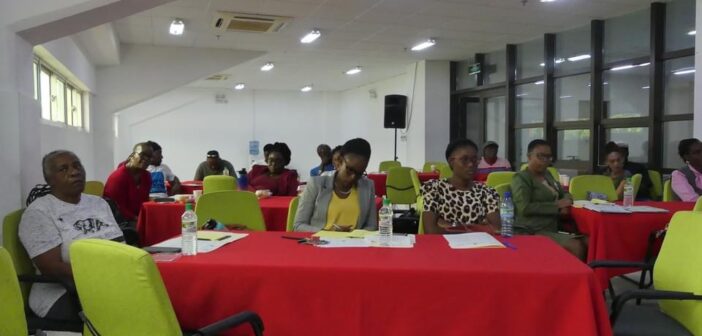The Ministry of Agriculture and Lands, Fisheries and Cooperatives is collaborating with the Ministry of Education, Youth, Sport and Culture, the Marketing and National Importing Board (MNIB), and the Food and Agriculture Organisation (FAO) in strengthening the operations of the School Feeding Programme in Grenada.
The initiative began with a Food Value Chain of Local Poultry workshop for farmers and other stakeholders at the National Stadium on November 28, 2022.
It is an output of the Rapid Chain Assessment Services of Selected Value Chains Linked to the School Feeding Programme in Grenada. It hopes to increase the need for local poultry to meet the needs and demands of benefitting schools.
The MNIB, under this project, is tasked with better serving the poultry community by becoming a leading value chain actor through supporting, procuring, and finding markets for local poultry.
Quality Assurance Manager at MNIB and Project Coordinator, Raquel Peters, outlined the objectives of the workshop as being to raise awareness of the poultry value chain actors to the School Feeding Programme as a potential community market; to identify the significant challenges, constraints, best practices, and successes of the poultry farmers and their potential to be linked to the School Feeding Market; to understand the value chain and it functions with an emphasis on the School Feeding Programme and the public market; and to identify procurement options, specific to the school feeding markets and its requirements.
In 2021, the FAO initiated and implemented several activities to support the school feeding programme in Grenada, but they were placed on hold due to unexpected challenges. Under this new revitalized approach, local poultry has been identified as the main commodity. Recommendations will be given for procurement modalities for implementation and scaling up, and a guide will be developed for farmers supplying local poultry.
Permanent Secretary in the Ministry of Agriculture and Lands, Fisheries and Cooperatives, Aaron Francois, underscored the importance of the initiative, not only to students but also to the economy.
He said, “Grenada loses significant foreign exchange for purchasing poultry outside Grenada. Suppose we allow this thirty-plus million dollars to remain here on island; what a difference it would make. Think about the impact on our school children, the school feeding programme, the enhanced nutrition.”
Food Aid Coordinator of the Ministry of Education’s School Feeding Programme, Lindy Ann Francis, explained that local chicken is used in only ten schools on the island. She welcomed the collaboration in increasing that number and meeting the objective of providing healthy and nutritious poultry for the programme.
She said, “There are no arguments that long-term advantages, both economically and health-wise, for using local meat, that it far outweighs our perceived gain that can be put forward for using imported meat. In the past, efforts to increase the use of local chicken in the school feeding programme have been a great challenge. While we are nowhere close to the volume of local chicken we would desire to use it in the programme, it must be noted that more schools currently use local chicken than we have used in the past.”
Senator with responsibility for Agriculture and Fisheries, Roderick St. Clair, advised that affordability be included in the project.
“When we think about Agriculture in Grenada, particularly regarding poultry, affordability is a big issue. I trust that within the context of the project, you find more affordable feed for our poultry farmers, such that we can be able to make food more available,” St. Clair remarked.
This workshop will follow others focusing on farmer-buyer relationships for local value chain actors to develop a guide for farmers. It would also highlight procurement modalities for the school feeding programme for local poultry, with agreed stakeholders and value chain actors.
Ministry of Agriculture and Land, Fisheries and Cooperatives…ensuring food and nutrition security.
![]()




